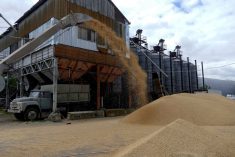Saskatoon — Grain transportation should be an election issue, says Cam Goff, chair of the Saskatchewan Barley Development Commission, which hosted the Farmers’ Forum on Grain Transportation here Monday along with the Agricultural Producers Association of Saskatchewan and the Saskatchewan Wheat Development Commission.
The forum coincided with Agriculture Minister Gerry Ritz’s announcement in Winnipeg of the recommendations of the Crop Logistics Working Group (CLWG). They are part of an overall review of the Canadian Transportation Act, which is not expected to be complete until next winter, and which could call for legislative changes. “It’s up to farmers to make this an election issue,” Goff said.
Read Also

CBOT Weekly: Grain, oilseed futures under pressure
November soybeans lost 23 U.S. cents per bushel during the week, while corn and wheat losses ranged from five to 10 cents.
Murad Al-Katib, president and CEO of pulse processing firm AGT Food and Ingredients Inc., represents the grain industry at the CTA review. Al-Katib told the forum that the review is a balancing act between the needs of farmers, railway companies, grain handling companies and end customers. “We will not achieve shipper utopia in this review and we certainly will not achieve rail utopia.”
He also said the grain sector supply chain must find its own solutions to transportation congestion. “We cannot ram all of the grain through the Port of Vancouver in four months a year,” Al-Katib said.
The CTA review covers all commodities, but is in part a response to transportation bottlenecks and high basis charges for farmers following the record Prairie grain crop of 2013/14. University of Saskatchewan agricultural economist Richard Gray said the above-average basis that year were over $5 billion, or about $50/tonne. “It’s real money,” he told the forum.
However, Gray noted that there may be a less desirable solution to the high basis levels this year. “The question is, how big is the crop out there?” A lower-than-average export volume would have the potential to lower the pressure on the rail system while the CTA review panel completes its work.
A smaller crop might also make the question of at the Maximum Rate Entitlement (MRE) less urgent for the coming year. Also known as the “revenue cap,” the MRE allows the railways to vary the rates they charge at different times an locations, but limits how much they can charge to ship the crop for the entire year.
The CLWG included two major findings about the MRE in its submission to the CTA review. First, the CLWG said “The MRE as a public policy tool is working.” Second, the CLWG says issues around rail service need to be resolved before a review of the costs included in the MRE is discussed. The CLWG said service issues should be separated from the MRE. “Service issues exist in all sectors, regardless of the freight rate,” the report said.
But Mary Jane Benett, a researcher from the Frontier Center for Public Policy told the Farmers’ Forum that the MRE should be dropped. “We must get rid of the rate regulation and move into a commercial system,” she said.














